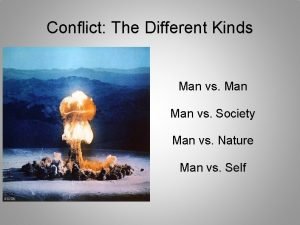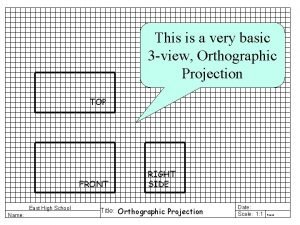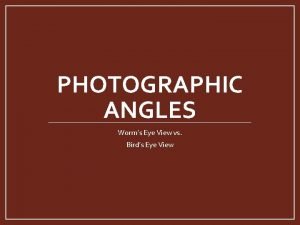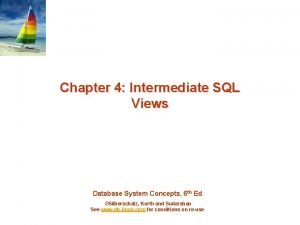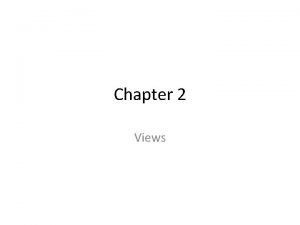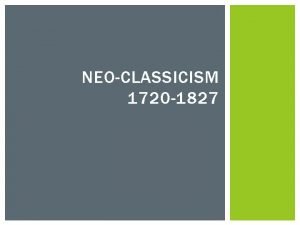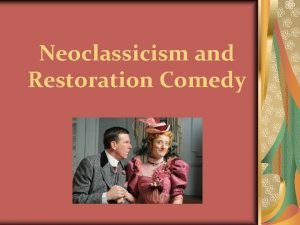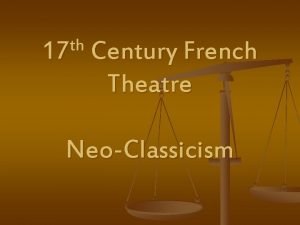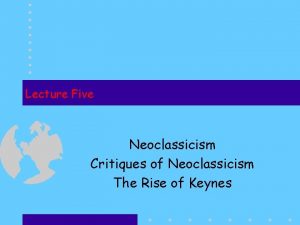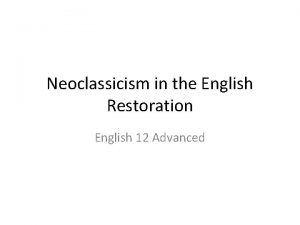Neoclassicism English III Neoclassicism View of man as











- Slides: 11

Neoclassicism English III

Neoclassicism �View of man as a man of reason �Regarded man a limited creature whose understanding was adequate (satisfactory) to explore the infinite (immeasurable/vast world) �Overlaps with Age of Reason time period

Neoclassicism (continued) �The revival of Greek and Roman ideals of art and literature that occurred in Europe in the 18 th century Enlightenment (Age of Reason) �Ideals include: �Respect for authority �Respect for tradition �Reason and order �Moderation (selfcontrol) �Simplicity (straightforwardness/ plainness)

Famous Writers

Philip Freneau (1752 -1832) �“Father of poetry” �Incorporated varieties of European Romanticism (order, balance, decorum, moderation) �Embraced liberal and democratic causes �Revolutionary militiaman; captured by the British, almost died; stimulated words condemning (criticizing) cruelties of British

Philip Freneau (cont. ) �Writing provided a good transition between neoclassicism and romanticism �Thomas Jefferson helped him establish the militant anti-Federalist National Gazette in 1791 �Became the first powerful, crusading editor in America

Washington Irving (1789 -1859) �First American writer of imaginative literature to gain international fame �Took ideas from German literature �Witty, poor student, but well read �Youngest of 11 children in wealthy family �Took the satirical writing of 18 th century and mocked/ridiculed the writings of his own time (typical of neoclassicism)

Washington Irving (cont. ) �Early works displayed neoclassical pleasure in the comic qualities of life �His work reflected shift in American literature from rationalism to sentimental romanticism �Major Works �“The Legend of Sleepy Hollow” �“Rip Van Winkle”

James Fenimore Cooper (17891851) �Never saw the frontier (border), yet his writing focused on this �Wrote sea novels �Created typical characters �Grew up in luxurious mansion; expelled from Yale; inherited money; went broke; began writing �Major Works �“The Leather Stocking Tales” �People dislike “The Leather Stocking Tales” (even still today)

Phillis Wheatley (1753 -1784) �Considered the first African. American writer of importance �Born in Africa; brought to America at 7; at 13 showed signs of a great poet �Material came from Bible and public events �Her works were used to prove that blacks were not inferior to whites

Phillis Wheatley (cont. ) �Her work displayed characteristics of neoclassicism �Nicknamed “The Sable Muse” in London (translation: black poet) �Major Works �“To S. M. , a Young African Painter on Seeing His Works” �“On Being Brought from Africa to America”
 Man vs. society
Man vs. society Hamlet act iii scene ii
Hamlet act iii scene ii English level iii
English level iii Orthographic view drawn directly above the front view
Orthographic view drawn directly above the front view Sectional view examples
Sectional view examples Revolved section example
Revolved section example How to draw half sectional view
How to draw half sectional view Worms eye view example
Worms eye view example What is end view
What is end view Isometric orthographic perspective drawing
Isometric orthographic perspective drawing For the view create view instructor_info as
For the view create view instructor_info as Simple view and complex view
Simple view and complex view
